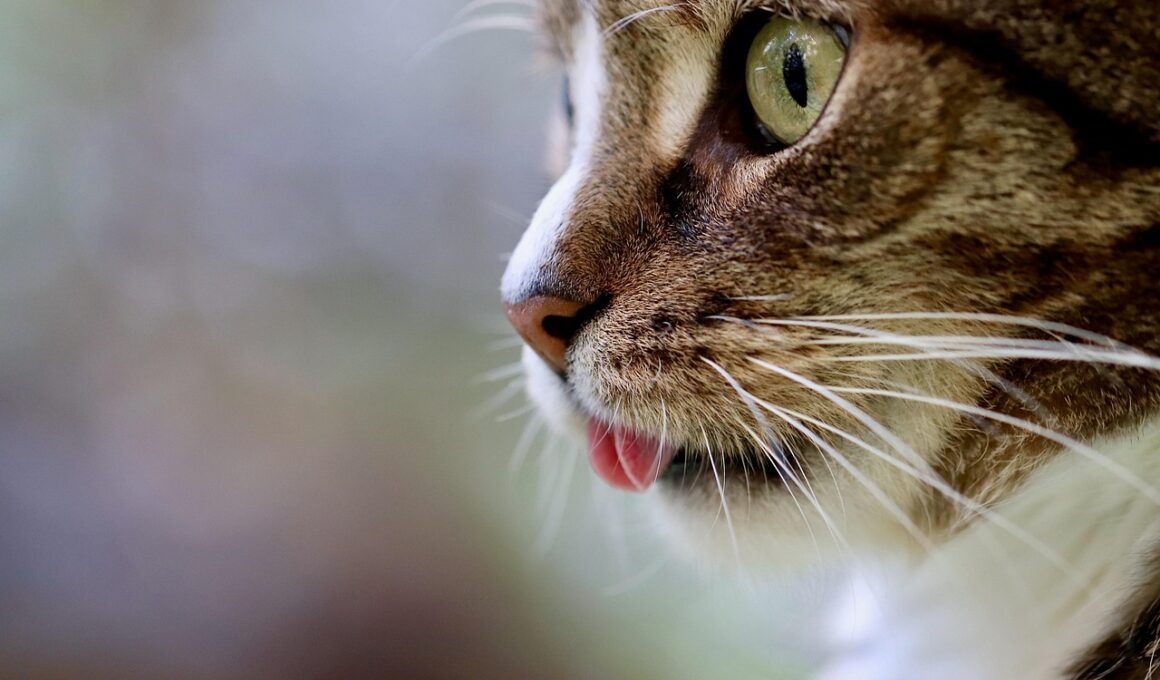The Benefits of Omega-3 Fatty Acids for Cats with Sensitive Stomachs
Omega-3 fatty acids are increasingly recognized for their valuable role in improving overall feline health, especially in cats dealing with sensitive stomachs. These essential nutrients, often sourced from fish oil, are particularly important for maintaining the integrity of the gastrointestinal tract. Sensitive stomachs can be an issue for many cats, causing discomfort, nausea, and occasional vomiting. Incorporating omega-3 fatty acids into your cat’s diet can alleviate these symptoms in various ways. First, they help reduce inflammation within the gut lining, promoting healing. Additionally, omega-3s can enhance the production of protective mucus in the intestines. This helps to coat the lining, providing a barrier against irritants that can cause digestive distress. Another important benefit is that omega-3 fatty acids are beneficial to a cat’s overall immune system, which often links directly to digestion health. By including these supplements, you’re not just feeding your cat but also giving it a better chance to thrive. Always consult your vet before starting any new supplement regimen for your cat to ensure it’s the right choice for them.
When it comes to selecting an omega-3 supplement for your feline friend, consider engaging a reputable veterinarian to guide you in this decision. Dosage and source are vital, as not all omega-3s are created equal. Fish oil is the most common form, benefiting from high bioavailability, making it easier for cats to absorb and utilize the nutrients. Flaxseed oil is another option, yet it contains alpha-linolenic acid (ALA), which is less effective for cats compared to the EPA and DHA found in fish oil. Choose high-quality products specifically formulated for pets to ensure they’re free from harmful additives or contaminants. Always read labels carefully and look for certifications that guarantee the purity and potency of the omega-3 supplements. Cats with sensitive stomachs may require a gradual introduction of supplements into their diet, so start with lower doses. Monitor your cat’s response and adjust according to your veterinarian’s advice. By selecting the right omega-3 fatty acid source, you can contribute to a healthier digestive system for your sensitive cat.
Potential Side Effects and Considerations
It’s crucial to understand that with any supplement, there’s a chance for side effects. Cats, being obligate carnivores, have unique dietary requirements, and too much omega-3 fatty acid can cause gastrointestinal issues like diarrhea or an upset stomach. Therefore, it’s important to follow proper dosing guidelines established by a veterinary nutritionist. Introducing omega-3s slowly into your cat’s diet can help mitigate these risks. Additionally, keep an eye out for signs of allergic reactions, such as itching, swelling, or lethargy, which could indicate that your cat is sensitive to the supplement. If you notice any of these symptoms, contact your veterinarian immediately. Furthermore, consider potential interactions with other medications. Omega-3 fatty acids can affect blood clotting, so if your cat is on anticoagulant therapy, discuss omega-3 supplementation with your vet. Striking the right balance is essential to harness the benefits without unwanted side effects, ensuring that your cat enjoys its meals and maintains optimal digestion health.
Incorporating omega-3 fatty acids into your cat’s diet can be done in a variety of ways. Many pet owners opt for liquid fish oils that can be added to their cat’s food or served directly. However, flavoring can be essential, as not all cats will readily consume supplements without additional palatability. Look for fish oils specifically flavored for cats to help ease the intake of these important nutrients. Another method is through commercially prepared cat food that contains added omega-3s, high-quality brands often utilize fish or fish meal as protein sources. This option ensures your cat receives the necessary fatty acids in a form they enjoy without the hassle of administering a separate supplement. Always monitor how your cat responds after introducing any dietary changes. Significant changes in their eating habits or stool may indicate that adjustments are needed. Documenting any changes in your cat’s health or mood can provide valuable information to discuss with your veterinarian during follow-up visits.
Benefits Beyond Digestive Health
While omega-3 fatty acids are incredibly beneficial for cats with sensitive stomachs, their advantages extend to other areas of health as well. The anti-inflammatory properties of omega-3s also play a critical role in skin and coat health. Cats suffering from allergies or skin conditions often experience a reduction in itching and irritation after incorporating these fatty acids into their diet. Additionally, the benefits of omega-3s can improve cognitive function, as research suggests these essential nutrients may help with memory, concentration, and overall mental clarity. Especially in senior cats, promoting brain health can significantly improve their quality of life as they age. Omega-3s are also beneficial for heart health, promoting a healthy cardiovascular system. They help to regulate cholesterol and improve circulation, which is essential for overall well-being. Thus, by adding omega-3 fatty acids, you not only aid your cat’s digestion but also contribute to their skin, coat, and heart health. The holistic benefits of omega-3 fatty acids make them a wise choice for any cat owner.
As a pet owner, being proactive about your cat’s dietary needs is essential. Regular veterinary check-ups will help monitor any dietary changes and assess their overall health. It’s equally important to maintain a balanced diet that encompasses all essential nutrients. Omega-3 fatty acids are just one component of a well-rounded feline diet. Ensure that your cat’s food also contains high-quality protein, vitamins, and minerals for optimal health. Discuss with your veterinarian any concerns and ask for guidance about integrating omega-3 supplements into your cat’s meals. They can recommend suitable products and dosages tailored to your cat’s unique health profile. Remember, hydration is also crucial; since omega-3 fatty acids can be fat-soluble, ensure your cat always has access to fresh water. Providing an enriching environment encourages your cat to play and remain active, which contributes to overall well-being. By focusing on both diet and lifestyle, you can significantly enhance your cat’s health, ensuring they live a long and happy life.
Conclusion: Embrace Omega-3s for Your Cat
In conclusion, the benefits of omega-3 fatty acids for cats, especially those with sensitive stomachs, are profound. They can offer relief from digestive issues, improve skin and coat health, enhance cognitive function, and promote heart health. However, as with any dietary supplements, knowledge and caution are key. Always consult your veterinarian before introducing any new supplement into your cat’s diet. This practice will prevent potential risks and side effects while ensuring that you choose the most appropriate supplement for your cat’s specific needs. Remember to observe your cat’s behavior and health after adding omega-3s to their routine, as their reactions can offer insights into the effectiveness of the supplement. The right dose and source are crucial for maximizing benefits while minimizing any possible negative effects. By adopting a thoughtful and careful approach to your cat’s nutrition, especially concerning sensitive stomachs, you can contribute to their happiness and health. Embrace omega-3 fatty acids not only as a remedy for sensitive stomachs but as a vital aspect of your cat’s overall dietary regimen.
By following these guidelines and remaining attentive to your cat’s specific health needs, omega-3 fatty acids can become an invaluable addition to their diet. These supplements aren’t just a fad—they are backed by research and have a long history of benefits for pets. With proper care, monitoring, and professional guidance, your sensitive cat can enjoy a diet that supports their health in numerous ways. From reducing digestive discomfort to enhancing overall vitality, the role of omega-3s is multifaceted and essential. Invest in high-quality products that meet stringent standards for purity and efficacy, and watch your cat flourish. This investment in their well-being can leave you and your pet happier in the long run, fostering a stronger bond that’s built on health and wellness. So, prioritize omega-3 fatty acids in your pet’s diet; the benefits are well worth the effort, providing you peace of mind and a happier feline friend. With a dedicated approach to ensuring your cat’s nutritional needs are met, you can help them lead a longer, healthier, and more active life.


